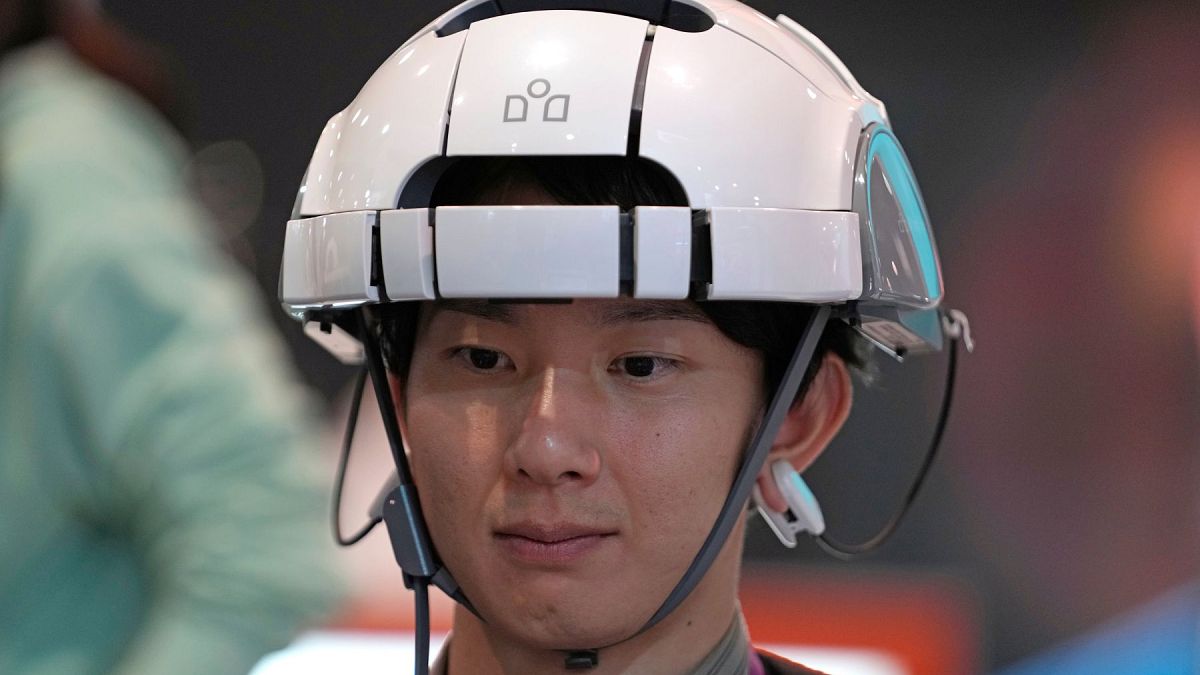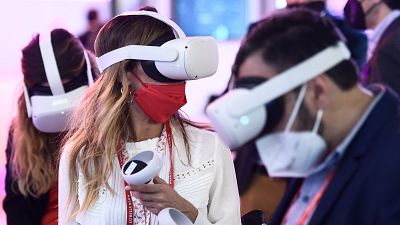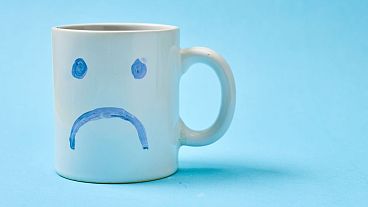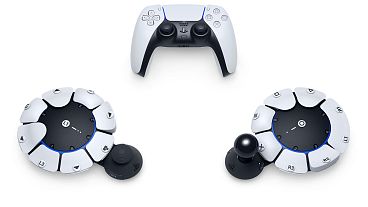From urine testing devices to AI baby monitors, here's some of the best health technology we've seen at CES 2023 in Las Vegas.
The CES tech show in Las Vegas has been packed with health gadgets this year, as technology continues to make huge advancements when it comes to helping consumers gain a better understanding of their general well-being.
Here's our pick of the best on display.
Smart toilets from Withings
We had to begin with Withings' connected "urine scan". This device provides an immediate snapshot of the body's balance by monitoring and detecting a large variety of biomarkers found in urine.
The device is just 9 cm in diameter and sits inside most toilet bowls. Results are then delivered to a smartphone app, providing analysis and recommendations based on the data.
"It's the first hands-free, at-home, connected urine analysis lab directly placed into your toilet bowl," Withings Product Owner Inna Ndaw told Euronews Next.
The company says it's planning two different use cases; one targeted towards hospitals and other healthcare settings, the other for consumers.
"Urine actually has over 3,000 metabolites. So, a wealth of information that today typically is not used very much because it's very difficult," Elizabeth Coleon from Withings told the Associated Press.
"Most people do not like to go and have a urinalysis. Typically, people will go once a year instead of being able to have that information tested over a regular basis and be given the longitudinal data, which can give much more insights to improve health," she added.
Healthy selfies by Caducy
Caducy, a device created by another French company called i-Virtual, measures health data in a different way.
Thanks to a 30-second video selfie, an analysis is conducted in the cloud with artificial intelligence (AI) and deep learning algorithms, including computer vision and signal processing.
Then the app gives info including heart rate, respiratory rate, and stress level - a way to conduct remote consultations, according to the company.
Gael Constancin, founder and CEO of i-Virtual, explained that the technology reads health signals from the face's skin.
"We see the blood moving through the skin. So, it's signal analysis. We measure the pulse rate form by signal analysis directly on the face of the person, and (for) the respiratory rate, we just look at the chest and we count, we count the movement".
Exoskeleton suits from German Bionic
Judging from what we've seen at CES this week, another tech that might help us in the future is exoskeletons.
With more and more items being shipped across the globe, it's a strain for warehouse workers whose jobs require heavy lifting.
German Bionic is working to fix this problem with the Apogee exoskeleton suit.
The Apogee, the 6th iteration of the product, is a lighter and stronger version and assists the user to more easily lift items up to 30 kg.
"So, the product is an active lifting exoskeleton, all powered by a single 40-volt battery," said David Mack from German Bionic.
"As you bend over, it knows your relative position to the ground. So, when you start to stand up again, it will sense those movements and pull you back up, compensating for almost 30 kg of lifting force".
Hello Aeo
Another robot on the show floor is Aeo, a new robot on a mission to keep buildings clean and give human workers a helping hand, particularly in short-staffed hospitals.
It's a busy life, but Aeo still found time to snap a few selfies with CES visitors.
The multi-talented robot by Aeolus Robotics, which is currently deployed in Japan, Hong Kong, and Taipei, can be used for ultraviolet (UV) disinfection, delivery and patrol services.
"This is really an assistant to human beings," Alex Huang, founder and CEO Aeolus Robotics, told Euronews Next.
He said Aeo could help serve people in elderly care, hospitals, hotels, and even airports and commercial buildings.
"It does a nightshift patrol, to monitor people's safety. It disinfects the most frequently touched areas to reduce COVID-19 infection, works with security guards to protect the whole building's safety, and can actually fetch and deliver goods, medicine, and foods".
AI baby monitors from Chillax Care
Another gadget used to check in on humans (albeit only small ones) is Chillax Care, a baby monitor powered by artificial intelligence (AI).
"The AI takes different measurements like baby's head temperature and sleep positioning," Jon Budgen, the company's vice president of sales, told Euronews Next.
The monitor uses infrared sensors, machine learning, and thermal imaging to track baby's breathing, whether it's getting a fever, and whether its face is covered or if it's rolling over onto its stomach -a position that sharply raises the risk of sudden infant death syndrome (SIDS).
"We can do other things to it over time, like measuring the temperature around the diaper area to see if baby even needs a diaper change," Budgen said.
Chillax Care stresses the data is processed using bank-rate encryption and there's no need for storage, as the device is essentially a real-time video surveillance camera for worried parents.
"We just want to take the worry away," Budgen said.



